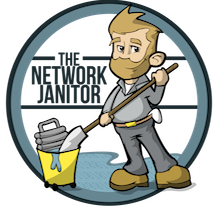Mentoring your way to better career happiness
Yesterday was possibly one of the proudest days in my professional life. My very good friend Anthony Burke sent me a text message just after 9am to tell me that he had passed his JNCIA-Junos exam. This is a close tie with when he earned his place as a delegate to Network Field Day 4 back in October.
So why am I so proud about this? Well Anthony and I have become great friends over the past 18 months all through the magic of social media. One day for no reason (as is the way of things) we just started talking. Tweets became skypes and in January, even though we had only ever met face to face once, my wife and I drove the 10 hour trip to Melbourne to attend his wedding. (Sitting at table answering the question of “So how do you know Anthony?” with “Oh. From the Internet” was a humorous experience)
So how is this different to any other random person on twitter? Well very early one I realised how eager Anthony was to learn more about network and to soak up knowledge from those willing to share it. I’m not entirely sure if he just caught me on the right day (Im pretty sure I commenced our first Skype with a rant about something he never saw coming because I needed to vent at somebody). Over the course of the coming months we maintained a Skype IM dialog open most of the day discussing various networking, technology and career issues.
I spent time helping him learn new topics and sharing any possible pointers and tidbits I had that might help him with what he was working on. In return he acted as a sounding board to bounce ideas off and offering up suggestions. Over time I noticed his advice back to me started to surprise me with how much he had already learned.
In my time as a senior engineer and various management roles I have been required to assist junior staff with both their technical and their career development. I always found this to be a difficult task because I was trying to balance what I wanted out of them as co-workers with what it is they wanted to do with their own careers. I had financial incentive to push them down the path that benefitted me more than it did them. Each time they moved away from “my chosen path” there was a feeling of disappointment or failure (on my part). Even when I worked with the staff to clarify where they wanted their careers to go, I felt they were trying give “the right answer” or at least the one they thought I wanted to hear.
I have since learnt that the most personally rewarding mentoring system for me is one where I get no personal benefit from the success or failure of the other participant. Helping them make the decisions that are right for them without those choices directly impacting my day to day work life has been quite a different experience. I am better able to frame my advice to give both the benefit of my own experiences coupled with knowing where they want to go professionally.
Mop and Bucket
In a recent email conversation, reference was made to the the gutting of the middle ranks of IT. We have a lot of junior staff and a lot of highly skilled engineers, but we are starting to see a thin mid-section (something my mirror cannot attest to). Whether this is due to the focus on specialisation vs generalist IT or not is uncertain to me, but I have seen evidence to suggest this accurate (or becoming so).
So how do we move junior engineers onto the path of becoming journeymen and future experts? I suggest that each of you should keep your eyes open to “up and comers”. The ones who “have it”. You will be surprised when and where you find them, but they are everywhere. Take the time to help them out when possible. Answer the questions that they ask. Take time to get to know their strengths, their weaknesses and their career aspirations. Put them in contact with your contacts and help build their network of resources. Everyone “knows a guy who knows that thing”. Pass it on. Our contacts are not just secret tools to make us look good.
Once they become a journeyman engineer, encourage them to also look for people to mentor and repeat the process. I have found this process to be very rewarding for me personally, and I plan to continue doing it. Having a mentor (or several) above you and below you can do a lot to encourage and maintain your own growth.
When I first started talking with Anthony, he had passed his CCNA and started studying for his CCNP. Since then he has continued on with increasing his Route, Switch and Security skills. He fell in love with the ASA (urgh) and despite much encouragement I couldnt talk him around to playing with Junos. In late October he finally got his hands on his own SRX110 and started using Junos for the first time. I just over a month he has learnt more than I learnt in my first 6 months playing with Juniper kit. He passed his JNCIA-Junos yesterday, and apparently preparing for his JNCIS-SEC.
Taking on new technologies and really understanding them so quickly? This is why I am proud.
If this sounds like a bit of a love letter to a friend then so be it 😀
And Burkey…. #FHP 😉

